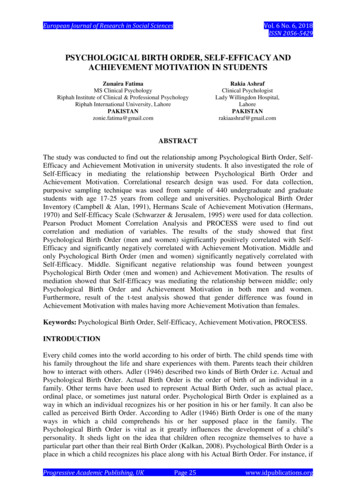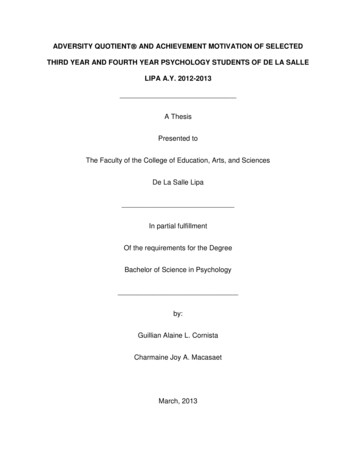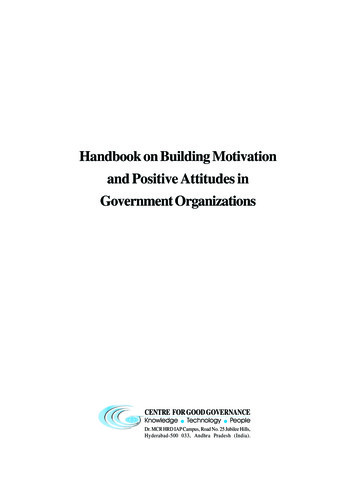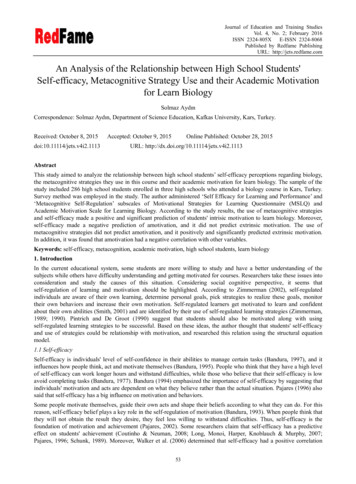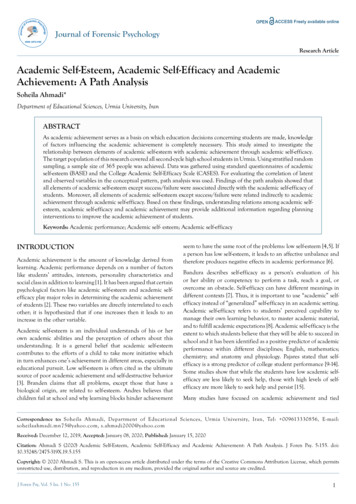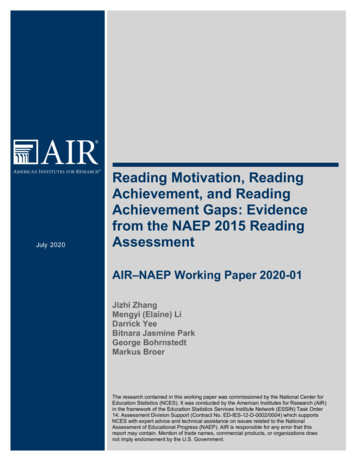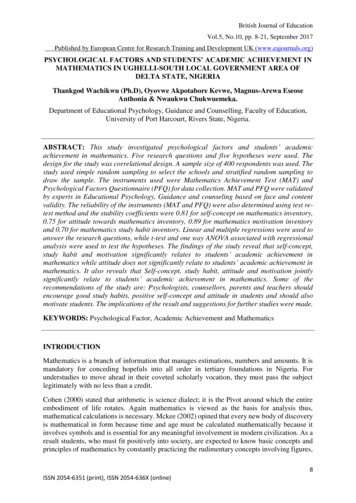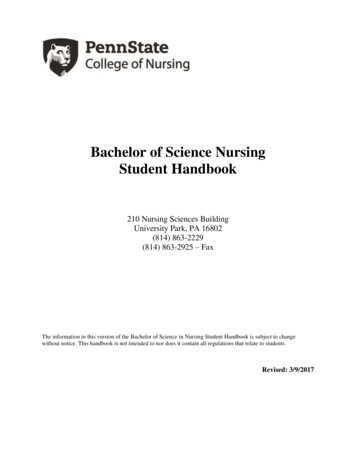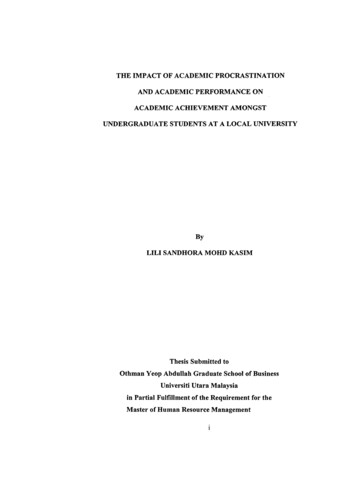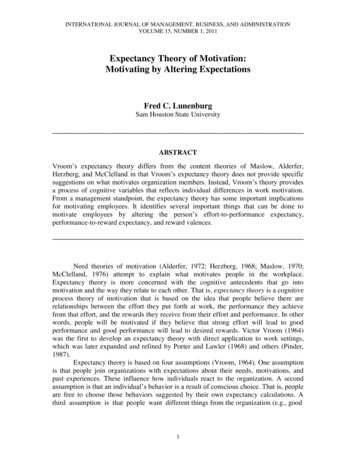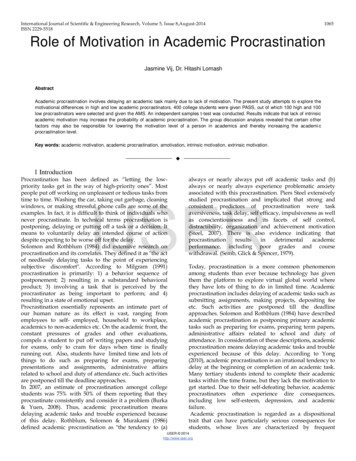
Transcription
International Journal of Scientific & Engineering Research, Volume 5, Issue 8,August-2014ISSN 2229-55181065Role of Motivation in Academic ProcrastinationJasmine Vij, Dr. Hitashi LomashAbstractAcademic procrastination involves delaying an academic task mainly due to lack of motivation. The present study attempts to e xplore themotivational differences in high and low academic procrastinators. 400 college students were given PASS, out of which 100 high and 100low procrastinators were selected and given the AMS. An independent samples t-test was conducted. Results indicate that lack of intrinsicacademic motivation may increase the probability of academic procrastination. The group discussion analysis revealed that certain otherfactors may also be responsible for lowering the motivation level of a person in academics and thereby increasing the academi cprocrastination level.Key words: academic motivation, academic procrastination, amotivation, intrinsic motivation, extrinsic motivation.—————————— ——————————1 IntroductionProcrastination has been defined as “letting the lowpriority tasks get in the way of high-priority ones”. Mostpeople put off working on unpleasant or tedious tasks fromtime to time. Washing the car, taking out garbage, cleaningwindows, or making stressful phone calls are some of theexamples. In fact, it is difficult to think of individuals whonever procrastinate. In technical terms procrastination ispostponing, delaying or putting off a task or a decision. Itmeans to voluntarily delay an intended course of actiondespite expecting to be worse off for the delay.Solomon and Rothblum (1984) did extensive research onprocrastination and its correlates. They defined it as "the actof needlessly delaying tasks to the point of experiencingsubjective discomfort". According to Milgram (1991)procrastination is primarily: 1) a behavior sequence ofpostponement; 2) resulting in a substandard behavioralproduct; 3) involving a task that is perceived by theprocrastinator as being important to perform; and 4)resulting in a state of emotional upset.Procrastination essentially represents an intimate part ofour human nature as its effect is vast, ranging fromemployees to self- employed, household to workplace,academics to non-academics etc. On the academic front, theconstant pressures of grades and other evaluations,compels a student to put off writing papers and studyingfor exams, only to cram for days when time is finallyrunning out. Also, students have limited time and lots ofthings to do such as preparing for exams, preparingpresentations and assignments, administrative affairsrelated to school and duty of attendance etc. Such activitiesare postponed till the deadline approaches.In 2007, an estimate of procrastination amongst collegestudents was 75% with 50% of them reporting that theyprocrastinate consistently and consider it a problem (Burka& Yuen, 2008). Thus, academic procrastination meansdelaying academic tasks and trouble experienced becauseof this delay. Rothblum, Solomon & Murakami (1986)defined academic procrastination as "the tendency to (a)always or nearly always put off academic tasks and (b)always or nearly always experience problematic anxietyassociated with this procrastination. Piers Steel extensivelystudied procrastination and implicated that strong andconsistent predictors of procrastination were taskaversiveness, task delay, self efficacy, impulsiveness as wellas conscientiousness and its facets of self control,distractibility, organization and achievement motivation(Steel, 2007). There is also evidence indicating formance, including poor grades and coursewithdrawal. (Semb, Glick & Spencer, 1979).IJSERToday, procrastination is a more common phenomenonamong students than ever because technology has giventhem the platform to explore virtual global world wherethey have lots of thing to do in limited time. Academicprocrastination includes delaying of academic tasks such assubmitting assignments, making projects, depositing feeetc. Such activities are postponed till the deadlineapproaches. Solomon and Rothblum (1984) have describedacademic procrastination as postponing primary academictasks such as preparing for exams, preparing term papers,administrative affairs related to school and duty ofattendance. In consideration of these descriptions, academicprocrastination means delaying academic tasks and troubleexperienced because of this delay. According to Yong(2010), academic procrastination is an irrational tendency todelay at the beginning or completion of an academic task.Many tertiary students intend to complete their academictasks within the time frame, but they lack the motivation toget started. Due to their self-defeating behavior, academicprocrastinators often experience dire consequences,including low self-esteem, depression, and academicfailure.Academic procrastination is regarded as a dispositionaltrait that can have particularly serious consequences forstudents, whose lives are characterized by frequentIJSER 2014http://www.ijser.org
International Journal of Scientific & Engineering Research, Volume 5, Issue 8,August-2014ISSN 2229-5518deadlines. Ellis and Knaus (2002) regard it as an“interactive dysfunctional and behavior avoidanceprocess,” characterized by the desire to avoid an activity,the promise to get to it later, and the use of excuse makingto justify the delay and avoid blame. It is often reinforcedby success after last minute cramming, thus strengtheningthe belief in this approach as aviable strategy. Ferrari(1992 & 2000) maintained that academic procrastinators failto attain academic goals due to task avoidance and fear offailure.Research has consistently demonstrated thatprocrastination is one of the biggest threats to academicperformance of the students ay each academic level. Suchbehavior has been reported to be negatively related to testperformance (Moon & Illingworth, 2005). Thus a student’sacademic performance has inverse relationship withprocrastination (Popoola, 2005) and leads to lower gradesin performances with deadlines (Tuckman, 2002).Recent research has been attempting to explore thepersonal and environmental factors contributing toacademic procrastination because such behavior disruptsnormal everyday functioning and impinges on one’s abilityto study, grow and progress in academic field. There aremany factors that seem to contribute to the delaying habitparticularly in students. Their interest (Ackerman, 2005),locus of control (Janneson & Carton, 1999), taskaversiveness (Ferrari, Keane, Wolfe & Beck, 1998),personality traits (Schouwenburg &Lay, 1995), anxiety(Solomon &Rothblum, 1984), evaluation threat (Bui, 2007)etc may all be responsible for procrastination in academicsettings. The reasons which students give for theirdelaying habit suggest that procrastination may beprevalent in certain situations and not in others like,students may delay academic activities but not other tasks.This hints towards a probable correlation between hismotivation level in academics and procrastination.Motivation is of particular interest to educationalpsychologists because of the crucial role it plays instudent’s academic learning. Academic motivation is astudent’s desire (as reflected in approach, persistence, andlevel of interest) regarding academic subjects when thestudent’s competence is judged against a standard ofperformance or excellence. Academic motivation is asubtype of the general construct of effectance motivation,which is defined as the “need” to be successful or effectivein dealing with ones environment. In Self-DeterminationTheory given by Deci & Ryan, (1985) a distinction has beenmade between different types of motivation based on thedifferent reasons or goals that give rise to an action. Themost basic distinction is between intrinsic motivation,which refers to doing something because it is inherentlyinteresting or enjoyable, and extrinsic motivation, whichrefers to doing something because it leads to a separableoutcome. Intrinsic motivation refers to the act of doing anactivity for itself, and the pleasure and satisfaction derivedfrom participation. Extrinsic motivation pertains to a widevariety of behaviors which are engaged in not for their ownsake but as a means to an end such as doing an act for areward or recognition. Apart from intrinsic and extrinsicmotivation, Deci and Ryan (1985a) claim that a third1066construct, amotivation, must be considered to fullyunderstand human behavior. Individuals are amotivatedwhen they do not perceive contingencies between outcomesand their own actions. They perceive their behavior ascaused by forces out of their own control.The present day education system make the students strivefor multiple goals in limited time resources. Such a scenarioleads to motivational conflicts. Students are confrontedwith a bundle of attractive activities they might want to getengaged in. A study by Fries et al. (2005) showed thatadolescents quite often reported conflicts between schooland leisure activities, between different school tasks, and,even more frequently, between different leisure activities. Ifstudents are confronted with a motivational conflictbetween a learning task and a leisure activity they have twooptions. They can decide for the leisure alternative andpostpone learning. In this case, learning time will probablybe reduced and the quality of academic outcomes willsuffer. Or they stick to their learning goal and turn theleisure option down. In this situation, there is evidence thatstudents experience motivational interference duringlearning. Whatsoever the case, motivational conflicts willhave a negative impact on academic work and may lead toprocrastination habit in the students.Researches have found an inverse relationship betweenacademic procratination and academic motivation level insome contexts. It is to say that students who are high onacademic procratination seem to have a lower academicmotivation level or student’s low academic motivation levelmakes them delay the tasks related to their academic field.That is, as motivation level decreases, tendency forprocrastination increases (Balkis, 2006; Lekich, 2006; Rakes& Dunn, 2010). According to Tuckman & Sexton (1992) andDiaz-Morales et al. (2008), procrastination arises from lackof motivation. In his another research, Tuckman (1998)asserted that it is hard to motivate an individual whoexhibits procrastination but he was successful in doing soby using tests as an incentive to motivate procrastinators tostudy. The conceptualization of academic motivation beinginternal (intrinsic) or external (extrinsic) has been wellindicated by Christopher (1998). In his research note hepostulated that students whose motivation is external aremore likely to procrastinate and intrinsically motivatedstudents procrastinate less and procrastination is associatedwith poor academic performance and negative studentattitudes. Also, it has been shown that students stinated less than those with less autonomousreasons and students who were amotivated or helpless inthe regulation of their academic behavior were likely toprocrastinate more (Senecal, Koestner & Vallerand, 1995).Similar results have been reported in a recent study by Katzet al (2013) that lack of autonomous motivation results inprocrastination and to reduce procrastination, studentsmust be supported to adopt a more autonomous type ofmotivation. Moreover, high procrastination was associatedwith lack of self-determined motivation and amotivationand intrinsic motivation showed significant unique effecton procrastination (Lee, 2005). A comparison of active andIJSERIJSER 2014http://www.ijser.org
International Journal of Scientific & Engineering Research, Volume 5, Issue 8,August-2014ISSN 2229-5518passive procrastination in relation to academic motivationindicated that high identification and low externalregulation increased active procrastination; low intrinsicand high external regulation increased passiveprocrastination (Seo, 2013).Although all the above researches have stressed ination, Reasinger and Brownlow (1996) havedemonstrated that lack of extrinsic motivation can alsopredict procrastination. While extrinsic motivators arealways present in a student’s environment these might notbe significant enough to serve as motivators particularlywhen students are not intrinsically motivated towards theiracademic work. Moreover, procrastinators may haveminimized the role of extrinsic motivators such ascompetition or evaluation pressures in their environment.Thus the reviewed researches support the notion thatprocrastination is a motivational problem that involvesmore than poor management skills or trait laziness. It isthus clear that procrastination involves knowing that one issupposed to perform an activity, and perhaps even wantingto do so, yet failing to motivate oneself to perform theactivity in the desired or expected time frame indicating theimportant role of academic motivation in the postponementhabit. Therefore, the present paper will focus on the role ofmotivation in academic procrastination. The purpose of thepresent research paper is to study academic procrastinators;therefore, students (age group 17-19 years) were selected asa sample for study. Although academic procrastination hasbeen researched extensively, there still remain some areasthat have not yet been touched upon. One of the researchgap identifies that majority of the researches on academicprocrastination has the population of students studyingarts subjects especially psychology. This might have biasedthe results. In order to overcome this gap, studentsstudying in undergraduate courses of technical colleges ofPunjab (India) were selected for the study. Thus thisresearch would help to explore a different dimension in thefield of procrastination among students attaining technicaleducation. In addition to this, although procrastination hasbeen researched extensively in different Asian countriessuch as Pakistan (Hussain and Sultan, 2010), Malaysia(Yaakub, 2000), Israel (Milgram, Mey-Tal & Levison, 1998)and Singapore (Tan, Ang , Klassen, Yeo ,Wong, Huan &Chong, 2008), procrastination in the Indian context has notbeen extensively researched and there was a need toconduct researches in India to identify additional factorsspecific to the Indian culture that might lead toprocrastination. This study would help to achieve this goal.Based on the Self-Determination Theory given by Deci &Ryan, (1985) and the above given researches, it waspresupposed that there will be a significant differencebetween high and low procrastinators on intrinsic andextrinsic motivation, with high procrastinators scoring lesson intrinsic motivation.1067males & 53 females) in the age group of 17-19 years (M 18.82, SD 0.39) studying in technical universities weretested for the present study. The data was collected on theprinciple of simple random sampling. Initially, 400 studentswere tested for their procrastination level out of which 100high and 100 low procrastinators were selected for furthertesting their academic motivation.2.2 T ESTS- Procrastination Assessment Scale-Students(PASS) was used to assess student’s procrastinationtendency in academic tasks. This scale is developed by L.J.Solomon and E.D. Rothblum (1984). It measures theprevalence of procrastination in six academic areas namely,writing a term paper, studying for an exam, keeping ative tasks, attending meetings, and performingacademic tasks in general. Specifically, participants areasked to rate the degree to which they procrastinate in thatarea (1 never procrastinate to 5 always procrastinate),procrastination in that area is a problem for them (1 not atall a problem to 5 always a problem) and if they want todecrease their procrastination in that area (1 do not wantto decrease to 5 definitely want to decrease).Academic Motivation Scale (AMS) was used to assessstudent’s motivation level in academic tasks. This test isdeveloped by R.J.Vallerand and his colleagues. It contains28 items to be answered on a 7-point rating scale that rangefrom not at all (1) to exactly (7). It is divided into sevensubscales, reflecting one subscale of amotivation, threesubscales of extrinsic motivation (external, introjected, andidentified regulation), and three distinct subscales ofintrinsic motivation (intrinsic motivation to know, toaccomplish things, and to experience stimulation).Besides these self-report measures, students’ aptitude levelwas reported as an AIEEE rank. AIEEE is an ‘All IndiaEngineering Eligibility Entrance’ test which indicates thestudents’ capability in engineering stream. Also thestudents were asked to report their CGPA (Current GradePoint Average) which indicates the present performance inthe class.IJSER2 METHODOLOGY2.1 SAMPLE- A homogenous group of 200 participants (1472.3 PROCEDURE- The objective of this study was to explorethe motivational differences in high and low academicprocrastinators studying in technical universities. Theprocedure was carried out in two phases. In the first phase,400 participants were selected by the procedure of simplerandom sampling. They were tested in eight groups of 50each. The participants were seated in the classroom andwere explained the meaning of procrastination. Then theywere provided with PASS with proper instructions toperform the test. In the second phase, 100 high and 100 lowacademic procrastinators were selected on the basis ofPASS score by using quartile deviation, i.e. values belowthe first quartile were taken as low academicprocrastination level and the values above the third quartilewere taken as high academic procrastination level. Theparticipants thus selected were given the AMS to assesstheir academic procrastination level and the type ofIJSER 2014http://www.ijser.org
International Journal of Scientific & Engineering Research, Volume 5, Issue 8,August-2014ISSN 2229-5518academic motivation. The motivational differences in highand low academic procrastinators were analyzed by usingthe t-test.Also, a group discussion was carried out for 100 highprocrastinators in 4 groups of 25 students each. Thediscussion was based on the students’ academic motivationand academic procrastination levels. The feedback wasanalyzed with reference to AIEEE rank and CGPA score.DATA ANALYSIS AND DISCUSSIONFor the present research an independent samples t-test wasconducted to compare the motivational differences in highand low academic procrastinators. The result of t-testindicates a statistically significant difference between highand low procrastinators in terms of intrinsic motivation,extrinsic motivation and amotivation. As is seen fromTable 1, high procrastinators exhibit less of intrinsicmotivation to know (M 18.53, SD 5.34), to accomplish(M 15.87, SD 4.92, to experience stimulation (M 15.06,SD 4.98) , identified extrinsic motivation (M 20.00,SD 4.98) and amotivation (M 10.95 ,SD 6.08) as comparedto low procrastinators’ intrinsic motivation to know(M 21.93, SD 4.48), to accomplish (M 17.51, SD 4.51), toexperience stimulation (M 17.09, SD 4.83), identifiedextrinsic motivation (M 21.42, SD 4.39) and amotivation(M 8.87, SD 4.96).(Table to be placed here)High and low procrastinators differ significantly onintrinsic motivation to know, t (198) -4.88 indicating thatprocrastination is related to lack of several constructs suchas exploration, curiosity and satisfaction experienced whilelearning. Thus, such students delay tasks because they donot possess intrinsic intellectuality and innate psychologicalneed for competence. If they would have been intrinsicallymotivated, there would have been no delay in the initiationof a task because of the sheer pleasure derived fromparticipation.class discussion , or read a book for the intense feeling ofcognitive pleasure derived from passionate and excitingpassages and thus are intrinsically motivated to experiencestimulation in education. With these findings, the first partof the hypothesis which states that there will be asignificant difference between high and low procrastinatorson intrinsic motivation has been proved.Considering the extrinsic motivation, high and lowprocrastinators differ significantly only on identifiedextrinsic motivation, t (198) -2.14. This finding is in linewith previous researches which indicate that studentswhose motivation is external are more likely toprocrastinate (Christopher, 1998). Low procrastinatorsshow more of identified extrinsic motivation as they do notdelay the start of an academic activity because it becomesvalued, is judged important for the individual and isperceived as chosen by oneself. In comparison, highprocrastinators do not realize the importance of a particularacademic task and thus keep on postponing it. The othertwo constructs of extrinsic motivation i.e. externalregulation (behavior is regulated through external meanssuch as reward or constraints) and introjection (individualbegins to internalize the reasons for his or her actions) donot differ significantly in high and low procrastinators.Thus, the second part of the hypothesis which states thatthere will be a significant difference between high and lowprocrastinators on extrinsic motivation has not been provedby the present results.The third construct amotivation indicates a tendency whenindividuals do not perceive contingencies betweenoutcomes and their own actions. They are neitherintrinsically nor extrinsically motivated. They perceive theirbehavior as caused by forces out of their own control.Eventually, they may stop participating in academicactivities and thus start procrastinating. However, thepresent findings indicate that high and low procrastinatorsdo not differ significantly on amotivation.The group discussion which was carried out after the dataanalysis revealed another interesting finding. There weremany students who were found to have a good AIEEE rankand thus they were able to secure admission in engineeringcolleges. However, their CGPA was low and also they werefound to be high on procrastination. This finding indicatesthat their academic motivation level had suddenly droppedalthough they had sufficient capability in the engineeringstream. The feedback given by such students revealed thattheir high procrastination level was instrumental in a lowmotivation score and thus lowered CGPA. This indicatedthat certain other factors may be responsible for loweringthe motivation level of a person in academics and therebyincreasing his/her academic procrastination level.To conclude, the findings of the present paper demonstratethat lack of intrinsic academic motivation may increase theprobability of academic procrastination. This has beenpointed out in a research by Senecal, Koestner & Vallerand,1995 that students with intrinsic reasons for pursuingacademic tasks procrastinated less than those with lessautonomous reasons including extrinsic motivation andIJSERA significant difference, t(198) -2.46, between high and lowprocrastinators on intrinsic motivation to accomplish hasbeen found indicating that students low on procrastinationengage in an activity for the pleasure and satisfactionexperienced when they attempt to accomplish or createsomething. Such students focus on the process of achievingrather than on the outcome. Thus, according to the finding,high procrastinators do not possess intrinsic motivation toaccomplish because it requires the students to extend theirwork beyond the prescribed outlines in order to experiencepleasure and satisfaction. In this attempt, they may have tosurpass themselves which is not a characteristic of highprocrastinators.High and low procrastinators also differ significantly onintrinsic motivation to experience stimulation, t (198) 2.93. The fact that high procrastinators delay the task athand and engage themselves in other activities explainsthat they are not motivated enough for the academic tasks.On the other hand, students low on procrastination go tothe class in order to experience excitement of a stimulating1068IJSER 2014http://www.ijser.org
International Journal of Scientific & Engineering Research, Volume 5, Issue 8,August-2014ISSN 2229-5518amotivation. Similar results have also been reported bySenecal, Julien &Guay (2003) indicating that students whoare regulated through intrinsic motivation and identifiedregulation towards scholastic work, experience low levelsof academic procrastination. On the other hand studentswho are motivated through external regulation, introjectedregulation or those who are amotivated experience highlevels of academic procrastination. And it is clear from theresults that low procrastinators have significantly higherlevels of intrinsic motivation to know, to accomplish and toexperience stimulation as compared to high procrastinators.Also, low procrastinators differ significantly from highprocrastinators in terms of identified extrinsic motivationand amotivation. The group discussion analysis revealed1069that certain other factors may be responsible for loweringthe motivation level of a person in academics and therebyincreasing his/her academic procrastination level.However, the limitation of the present study is that only themotivational factors of the procrastinators were evaluatedand other factors were not considered. For future researchdirections, a complete picture of procrastination wouldestablish a causal relationship between procrastination andits correlates by considering situational factors (Bui, 2007reported that procrastination can be reduced by decreasingevaluation threat), task characteristics such as taskaversiveness (Onwuenbuzie & Collins, 2001) as well ascognitive variables (Beck, Koons & Milgram, 2000) leadingto delaying behavior etc.REFERENCESAckerman, D.S. (2005). My Instructor Made Me Do It: TaskCharacteristics of Procrastination. Journal of MarketingEducation. Vol.27, no.1, pg.5-13.Janneson, T. and Carton, J.S.(1999). The effects of locus ofcontrol and task difficulty on procrastination. The Journalof Genetic Psychology. Vol.160, no.4, pg.436-442.IJSERBalkis, M.(2006) .The relationships between studentteachers’ procrastination behaviors and thinking styles anddecision making styles. Unpublished PhD Thesis. DokuzEylul Institute of Education Sciences, Izmir.Bui, N.H. (2007). Effect of Evaluation Threat onProcrastination Behavior. The Journal of Social Psychology.Vol.147, no.3, pg.197-209.Burka, J.B. and Yuen, L.M. (2008). Procrastination. WhyYou Do It, What To Do About It Now. MA: Da Capo Press.Christopher, O. (1998). The Causes and Consequences ofAcademic Procrastination. Westminster Studies inEducation. Vol.21, pg.73-75.Deci, E. L., & Ryan, R. M. (1985). Intrinsic motivation andself -determination in human behavior. New York: Plenum.Ellis, A. and Knaus, W.J. (2002). OvercomingProcrastination. Revised edition. New York: Institute forRational Living.Ferrari, J.R.; Keane, S.M.; Wolfe, R.N., and Beck, B.L. (1998).The Antecedents and Consequences of Academic astination. Research in Higher Education. Vol.39, no.2,pg.199-215.Husain, I. Sultan, S. (2010). Analysis of procrastinationamong university students. Procedia Social and BehavioralSciences. Vol.5, pg. 1897-1904.Lee, E. (2005). The Relationship of Motivation and FlowExperience to Academic Procrastination in UniversityStudents. The Journal of Genetic Psychology. Vol.166, no.1,pg. stination. Journal of School Psychology. Vol.31, no.4,pg.487-500.Milgram, N.A., Mey-Tal, G. and Levison, Y. (1998).Procrastination, generalized or specific, in college studentsand their parents. Personality and Individual Differences.Vol.25, no.2, pg.297-316.Moon, S.M. & Illingworth, A.J. (2005). Exploring thedynamic nature of procrastination: A latent growth curveanalysis of academic procrastination. Personality andIndividual Differences. Vol.38, no.2, pg.297-309.Popoola, B.I. (2005). A Study of Procrastinatory Behaviourand Academic Performance of Undergraduate Students inSouth Western Nigeria. Journal of Social Science. Vol.11,no.3, pg.215-218.Schouwenberg, H.C. and Lay, C.H.(1995). TraitProcrastination and the Big Five Factors of Personality.Personality and Individual Differences. Vol.18, no.4,pg.481-490.Semb, G.; Glick, D.M., and Spencer, R.E.(1979). Studentwithdrawals and delayed work patterns in self-pacedpsychology courses. Teaching of Psychology. no.6, pg-23-IJSER 2014http://www.ijser.org
International Journal of Scientific & Engineering Research, Volume 5, Issue 8,August-2014ISSN 2229-551825.Senecal, C.; Julien, E. and Guay, F.(2003). Role conflict andacademic procrastination: A self-determination perspective.European Journal of Social Psychology.Vol.33, pg.135-145.Senecal, C.; Koestner, R., and Vallerand, R.J (1995). SelfRegulation and Academic Procrastination. The Journal ofSocial Psychology. Vol.135, no.5, icProcrastination: Frequency and Cognitive-behavioralcorrelates. Journal of Counseling Psychology. Vol.31, no.4,pg.503-509.Steel, P.(2007). The Nature of Procrastination. A MetaAnalytic and Theoretical Review of Self Regulatory Failure.Psychological Bulletin. Vol.133, no.1, pg.65-94.Tan, C.X.; Ang, R.P.; Klasse, R.N.; Yeo, L.S.; Wong, I.Y.F.;Huan, V.S. & Chong, W.H. (2008). Correlates of AcademicProcrastination and Students’ Grade Goals. Curr Psychol.Vol.27, pg.135-144.IJSERTuckman, B.W. (2002). Academic Procrastinators: TheirRationalizations and Web-course performance. Paperpresented at the American Psychological Association,ChicagoYaakub, N.F.(2000). Procrastination Among Students inInstitutes of Higher Learning: Challenges for K-Economy.School of Languages and Scientific Thinking.
distractibility, organization and achievement motivation (Steel, 2007). There is also evidence indicating that procrastination results in detrimental academic performance, including poor grades and course withdrawal. (Semb,
